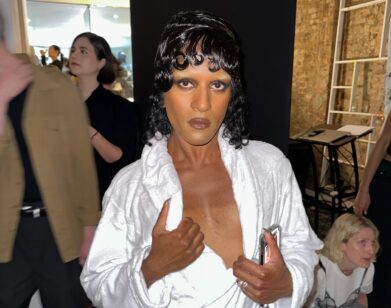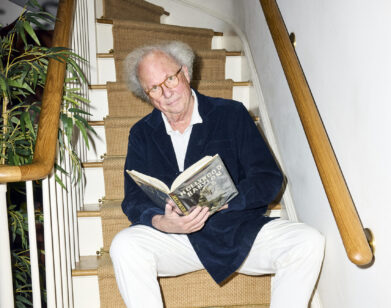The New York Novelist

ABOVE: ELIZA KENNEDY AT HER HOME IN NEW YORK, NOVEMBER 2014. PHOTO: CHRISTOPHER GABELLO.
“I didn’t conceive of the book as ‘I want to share this message about monogamy,'” explains Eliza Kennedy of her forthcoming debut novel, I Take You (Crown). “I conceived it as a very quick and comical read. One of those books that’s very enjoyable, and you’re sorry when it’s over, but then it’s over,” she continues. “Near the end of writing it, I began to realize that I did actually have more to say about some of these issues, things that are a little more substantive.”
Kennedy’s heroine, Lily Wilder, is fun, smart, impulsive, outrageous, privileged, and self-centered. An associate lawyer at a white-shoe New York firm, Lily is about to fly to Key West, her hometown, to marry Will, a too-good-to-be-true associate curator at the Met. She’s a bit apprehensive about her coming nuptials. Maybe because she’s sleeping with her boss (not because she needs to get ahead, she’s good at her job without any help, but because she likes the sex), or because she’s not above having sex with someone she meets in a bar or one of her fiancés groomsmen. But her apprehension isn’t affecting her behavior. “I don’t deserve him I know this,” Lily says of Will. “The fact that I acknowledge I’m a terrible person doesn’t make me any less terrible. I know this, too.”
“Most wedding books—and really fairytales—are about the wedding as the ending, and I wanted this beginning,” says Kennedy.
Raised in Chicago, Kennedy went to university in Iowa and Harvard Law School. Like Lily, she was a lawyer in New York and she married her husband, celebrated novelist Joshua Ferris, in Key West. That, however, is where the similarities end; Kennedy is not Lily. If anything, she’s Lily’s more grounded best friend Freddie. “The way that Freddie was thinking about the situation is the most like how I would,” she tells us.
Before the holidays, we met Kennedy at a café in New York.
EMMA BROWN: You were a lawyer in New York. Did you change careers when you had your son?
ELIZA KENNEDY: I stopped, actually, a little bit before. I clerked for a judge for a year and then I went to this big firm. I was there for about three and a half years doing litigation—pretty much what Lily does in the book. I actually really loved it, but I got burned out. The hours were insane. I decided to take a little time off. Usually what happens as a woman associate, you get pregnant first and then you leave. I decided to leave first and then I got pregnant. I decided to stay home for a while. I tried working part time, but it didn’t really work that well for me. I stayed home with Cooper, our son. Then the time was coming when I was going to have to head back to work, because we were running out of money, basically. I had one year left. I always loved reading and writing, so I thought I’d give it a shot. I wrote it that final year, as the clock was ticking, which was wonderful because I need that kind of pressure and fear to really sit down at the desk and work.
BROWN: What did you want to be when you were a five-year-old?
KENNEDY: I wanted to be Miss America.
BROWN: Actually?
KENNEDY: I actually did. [laughs] I was obsessed with beauty pageants. I loved them. It’s very strange looking back. It was really kind of sad, because when I got older and I was a pretty awkward looking kid; things didn’t go so well for me for a number of years. I remember there was one point where I was like, “Well, I don’t think that’s going to happen. I’ve got to move on.”
BROWN: When did writing enter the picture then? Do you come from an artistic family?
KENNEDY: My parents are big readers and they read to us all the time. I was a total bookworm as a kid. I loved to read. I think pretty early on I was writing stories and that continued definitely through high school. I remember writing these awful, strange stories. Then in college I put it away for a little while. I never had the right kind of discipline to do it. I think there was a part of me that enjoyed the idea of writing more than sitting down and actually doing it. Looking back, I think I was kind of figuring it out and didn’t know what I should be writing. I didn’t hit on the thing I should’ve been doing so I stopped doing it. The main problem was just sitting down at the desk and doing the work and not getting defeated. I didn’t figure that out until this book.
BROWN: Is it difficult to write at home when your husband is also writing there?
KENNEDY: Actually, the way I wrote this book was I would take our son to preschool and then go to the public library. That was where I wrote it. I am immune to distraction. It was in this town upstate called Rhinebeck, and it’s a lovely library, but it’s full of people who really like to talk very loudly. I learned to tune it out. At home Josh had a room—he had his office because he had already been a writer. I never had a space, which was actually kind of good because I never needed it. Now that we’re in the apartment [in Manhattan], I have a little desk in the corner. I’m fine. I think he finds it a little more challenging. He claims I’m a very loud typer.
BROWN: When did the character of Lily come to you? Was she your point of entry into I Take You?
KENNEDY: Yeah, it was her voice. One of those earlier failed efforts to write a book, I had this general idea of a wedding set in Key West because that’s where we got married. I knew a lot about it and Josh is not from there, but he grew up there for about seven years. I thought it’d be a fun place to set a book. I couldn’t really write that one the right way and I’d tried other things. Then I was in the gym, running on the treadmill [and] I really hate to do that, so I tend to be in a very bad mood when I’m doing it. I thought back to that idea and why couldn’t I get it to work. I had a very clear thought, “What if the bride didn’t want to get married?” Then I thought, “Why wouldn’t she want get married?” “Because she likes to sleep around.” That opened the floodgates. I went to the library after that and within the day, I’d written the first chapter of the book. The first lines came easily and after that I had her voice in my head. It definitely didn’t stay that easy. I had a really hard time figuring out how to write a book, but that was how it started.
BROWN: What was the first wall you hit in the writing process?
KENNEDY: It was allowing myself enough time to let an idea or a scene develop. I found myself rushing too much. In early versions of it, her interior voice is missing. You don’t know why she’s doing these things; she’s just doing them. I realized that I have to leave a lot to the reader to make decisions about what they approve of and what they don’t approve of and what they think, but I have to give them some idea of what’s going on in her head, because if I don’t do that, then this person isn’t real, she’s just this obvious character roaming around in the world. So that was hard to figure out: how much do I include, and how much do I have to let it go and let people just figure it out for themselves.
BROWN: Did you show the novel to people as you were working on it?
KENNEDY: I showed it to Josh. I had been working on this other thing too. I had 50 pages of that and then I had about 10 pages of this. I showed both of them to him. I really wanted to work on this, but I had so little, and I didn’t really know where it was going. I said, “Which do you think I should do?” He said this one, and that made me very happy because that’s what I wanted to do, but I felt like I’d invested so much time [in the other one]—those 50 pages did not come easy. I felt like I had to be given permission in a way to let them go and work on this. Then throughout the rest of it I showed it to nobody except him. I finally, near the end, showed it to my father. He knew I was doing it and he was just dying to read it, but I was very uncomfortable with that idea because of the book. He loved it. He was very supportive. He’s a reader, but he’s not particularly critical, so he couldn’t tell me, “I think this is working and this is not.” For that I had only Josh. Since I didn’t go to a writing program, my friends are not the kind of people who can really give me critical advice. He had a lot of work to do. [laughs]
BROWN: I’ll often ask my boyfriend to read my articles, but then half of the time I ignore what he says, even if it’s good advice.
KENNEDY: I had to learn to listen to myself and not just accept everything that Josh said. Just because, between the two of us, he’s so much more experienced—not just in writing, but in critiquing other people’s writing. I had to stop myself from just agreeing with everything and changing everything. Sometimes I would try and then I was like, “No, this isn’t what I meant at all.” Or he would have an idea of how it should be, which is a good idea and an interesting idea, but it’s his idea, not my idea.
BROWN: Obviously Josh has been so successful, was it difficult to say, “I want to be a writer too?”
KENNEDY: Yeah. It was very difficult. Even though he liked it and thought it was funny and interesting, it was not the kind of book that he writes and not the kind of book that he reads, so we didn’t know if anybody else would like it. Especially as I was writing it, I had no idea if I was doing it well or not. I definitely had that kind of cringing self-consciousness of the spouse of a writer who’s just like, “Hey, I’m going to be a writer too!” And we have so many friends who are writers. I was weirdly secretive about what I was doing. People knew—friends of ours knew that I was writing or I was trying to write—but I didn’t really want to talk about it at all. I think it was a little surprising to some people when all of a sudden I was done and I had the great luck of selling it.
BROWN: Do you feel like a writer now?
KENNEDY: Sometimes. It took a while. I probably expected some validation from the process of getting an agent and selling the book, but it didn’t happen right away. I got to know my editor better and we did edits together and then they came up with the cover, so, little by little, it’s become a more real thing. As I sit down everyday at the desk and I’m working on a new [novel], I’m getting there. But it’s still a little weird. When people ask me what I do, there’s a little catch before I can say I’m a writer. Or for a while I had to qualify it by saying, “I’m a writer, but I used to be a lawyer” as if that was somehow relevant.
BROWN: Lily has, as you mentioned, a very strong voice. When you were writing the book, did you find it seeping into your personal life or was it easy to it shut off?
KENNEDY: It wasn’t easy to shut it off. It’s strange because she’s not like me—or I’m not like her—but I was obviously tapping into something. Once I started writing it and I had her voice in my head, sometimes it would just be there. I would often be doing something or out in the world and it would be easy to come to the somewhat confrontational or mildly inappropriate thing that Lily would do. Not that I would do it, but I could imagine what it would be, which was fun because it gave me more ideas of what to do with her inside the book. Even now, it was nice to take a break from her for a while because it could be a bit much, but I’m kind of getting back into it.
BROWN: Can you say anything about the book you’re working on now?
KENNEDY: My main character is a woman again, but she’s very, very different from Lily. She’s also a lawyer, but she’s very powerful and a little bit older and married. It’s basically about what happens to her when she finds out her husband is having an affair. I try to make her a compelling character and make it funny, but it’s a little more serious because of what it’s about and a little more ambitious. I was going into this one with more ideas of what the book was about, which ultimately is making it harder to write. She works at the same firm as Lily—I don’t think there will be any interaction, but there will be a few references. I thought it would be fun to have a series of books about different people but at the same place who have these vague connections.
I TAKE YOU WILL BE RELEASED THIS MAY VIA CROWN PUBLISHERS.
For more from the 15 Faces of 2015, click here






